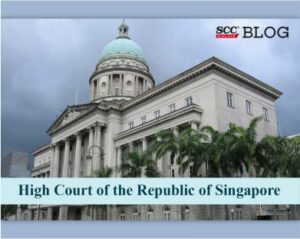High Court of the Republic of Singapore: While deciding a case related to marital privilege, Chua Lee Ming* J. held that records kept by companies fell outside the scope of S. 124(1) of the Evidence Act and the same cannot be regarded as spousal communications providing marital privilege within the meaning of S. 124(1) of the Evidence Act.
Factual Matrix
In the present matter, the defendant no. 1 is the director of the plaintiff company and current husband of the defendant no. 2. The defendant no. 1 divorced his previous wife in 2010 who is also the director of the plaintiff company. The defendant no. 1 in addition to the Plaintiff was also the sole director and shareholder of CTE Automobile, Alpha Refrigeration and Central Automotive and director and 60% shareholder of United SG which are also the defendants in the case. It was alleged by the plaintiff that the defendant no. 1 in collusion with the defendants breached his fiduciary duties that were owed to SAPL by giving the defendant companies undue preferential treatment while diverting customer and corporate opportunities. It was also alleged that the defendants solicited the employees from the plaintiff and conspired to injure the plaintiff. The plaintiff sought the disclosure of the correspondence between the defendants. The Assistant Registrar (AR) in the case rejected the plaintiff’s application for the above disclosures in so far as they pertained to communications made between defendant no. 1 and defendant no. 2 during the subsistence of their marriage as it was protected against disclosure under S. 124(1) of the Evident Act.
Plaintiff’s Contentions
The plaintiff contended that the language in S. 124(1) of the Evident Act was clear; it explicitly referred to communications to the person who had to provide the disclosure. The plaintiff placed reliance on Enjin Pte Ltd. v. Pritchard Lilia, [2022] SGHC 201 and stated that the protection in S. 124(1) applies only to communications made by the spouse as principal and that communications made by the spouse as agent for a third party were not protected as such records could not be regarded as spousal communications within the meaning of S. 124(1). The plaintiff argued that the protection afforded by S. 124(1) could be waived and the inference can be drawn from the conduct of the spouse. The plaintiff claimed that S. 133 is only applied when someone held the papers in their capacity as the owner of the documents’ agent.
Defendant’s Contention
The defendants while supporting the AR’s decision relied upon Tan Cheng Bock v. Attorney-General, [2017] 2 SLR 850 and contended that the plaintiff’s interpretation would render S. 124(1) idle if an applicant is allowed to sought disclosure against both spouses.
The defendants argued that it would be challenging to distinguish between communications between husband and wife made in their capacities as spouses and those made on behalf of other companies. The defendants further contended that keeping an e-mail in server of third company does not amount to waiver of the protection under S. 124(1) and hence as per S. 133 cannot be compelled to produce such documents.
Court’s Observation
The Court observed that “s 124(1) of the EA only protected a person from being compelled to disclose communications made to him by his spouse during marriage; it did not protect communications made by him to his spouse during marriage.”
The Court observed that the plaintiff’s interpretation should have been followed by the AR in this particular regard. The Court further observed that defendant’s assumption that the plaintiff’s interpretation would render S. 124(1) idle is not necessarily true in every case. The Court refused to grant the husband and wife in this particular case protection under S. 124(1) from being compelled to disclose communications. It was stated that that indeed it could be challenging to distinguish between communications between husband and wife made in their capacities as spouses and those made on behalf of other companies, but such challenges are not unbeatable.
The Court while discussing Asplenium Land Pte Ltd. v. Lam Chye Shing, [2019] 5 SLR 130 observed that the communicator spouse cannot rely on S. 133 and in the same light, if the communications between husband and wife were made by them to the other spouse, in their capacity as agents for third parties, or if the protection provided by S. 124(1) had been waived, the Defendant Companies were not entitled to rely on S. 133.
Court’s Decision
Partly allowing the plaint, the Court ordered for the disclosure of documents under Ss. 124(1) and 133 of the Evidence Act.
[Systematic Airconditioning Pte Ltd. v. Ho Seng Ken, [2023] SGHC 10, decided on 16-01-2023]
*Judgment by Justice Chua Lee Ming.
Advocates who appeared in this case :
Lua Wei Liang Wilbur and Lau Chung Kit Darryl (Covenant Chambers LLC), Counsel for the Plaintiff;
Loo Chieh Ling Kate, Lee Junyi Morgan and Jerelyn Tay Yee Ying (Ling Law Corporation), Counsel for the Defendant Nos. 1 and 4;
Khoo Ching Shin Shem, Teo Jia Hui Veronica and Genesa Tan Yun Ru (Focus Law Asia LLC), Counsel for the Defendant Nos. 2, 3, 5 and 6.
*Ritu Singh, Editorial Assistant has put this report together.

